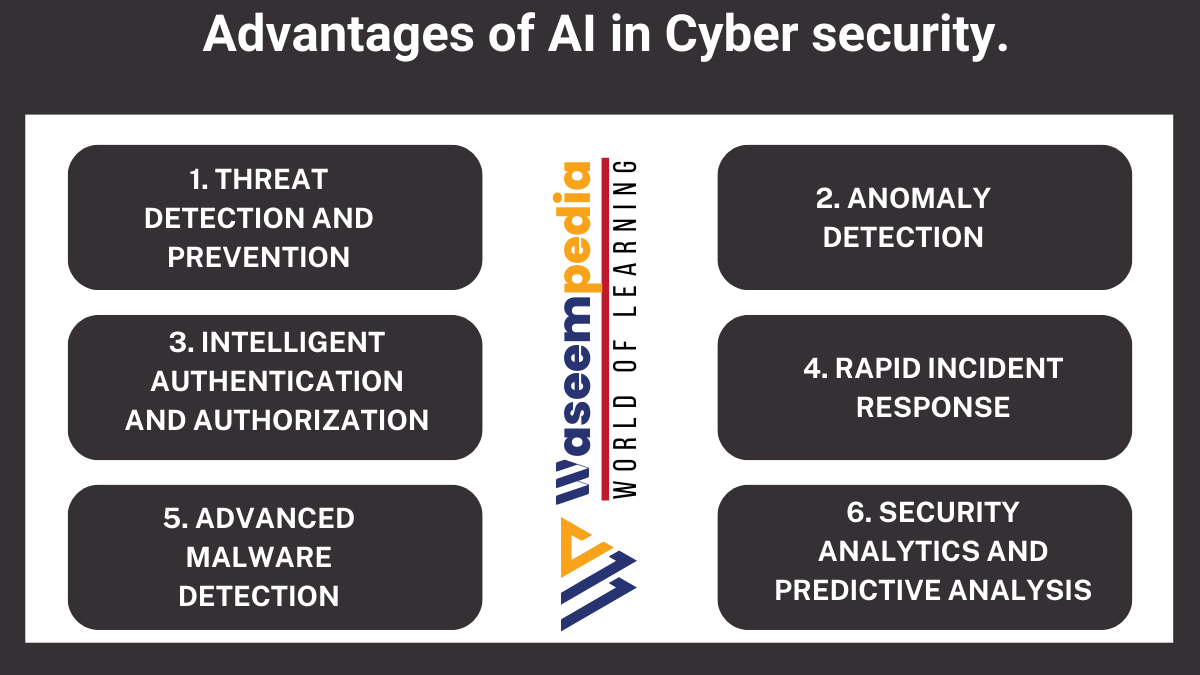In an increasingly interconnected world, cyber security has become a critical concern for individuals, businesses, and governments alike. As cyber threats continue to evolve and become more sophisticated, the need for robust cyber security measures is paramount.
Artificial Intelligence (AI) has emerged as a powerful tool in the fight against cybercrime. In this article, we will explore the advantages of artificial intelligence in cyber security and how it is revolutionizing the field.
The Role of Artificial Intelligence in Cyber security
Artificial Intelligence in cyber security refers to the use of machine learning algorithms and advanced analytics to detect and mitigate cyber threats. AI systems analyze vast amounts of data, identify patterns, and make intelligent decisions to protect digital assets and networks from malicious activities.
11. Advantages of AI in Cyber security.
11 Advantages of Artificial Intelligence in Cyber security are as following:
1. Threat Detection and Prevention
AI-powered cyber security systems excel in threat detection and prevention. By analyzing network traffic, user behavior, and system logs, AI algorithms can identify suspicious activities and potential threats in real-time. This proactive approach enables organizations to respond swiftly and prevent attacks before they cause significant damage.
2. Anomaly Detection
AI algorithms are adept at detecting anomalies in data patterns. By establishing baselines of normal behavior, AI systems can identify deviations that may indicate a cyber threat. Anomaly detection helps uncover previously unknown attack vectors and assists in identifying zero-day vulnerabilities.
3. Intelligent Authentication and Authorization
Artificial Intelligence enhances authentication and authorization processes by leveraging biometrics, behavioral analysis, and contextual data. AI-powered authentication systems can accurately verify the identity of users and detect fraudulent activities. This ensures that only authorized individuals have access to sensitive data and systems.
4. Rapid Incident Response
Timely incident response is crucial in mitigating the impact of cyber attacks. AI systems enable rapid incident response by automating the identification, analysis, and containment of security incidents. By leveraging AI-powered playbooks and response workflows, organizations can minimize the damage caused by cyber threats.
5. Advanced Malware Detection
Malware is a persistent threat in the cybersecurity landscape. AI-driven malware detection systems utilize machine learning models to identify and classify malware based on behavioral patterns, file analysis, and network behavior. This proactive approach helps organizations stay ahead of evolving malware threats.
6. Security Analytics and Predictive Analysis
AI-powered security analytics tools provide organizations with actionable insights and predictive analysis. By analyzing data from multiple sources, including log files, network traffic, and threat intelligence feeds, AI systems can identify potential vulnerabilities and predict future attack vectors. This empowers organizations to proactively strengthen their security posture.
7. User Behavior Analytics
AI systems can analyze user behavior and detect anomalous activities that may indicate insider threats or compromised accounts. By monitoring user actions, AI can identify patterns that deviate from normal behavior and trigger alerts for further investigation. User behavior analytics enhances the overall security of an organization’s digital ecosystem.
8. Vulnerability Management
Identifying and patching vulnerabilities is a critical aspect of cyber security. AI algorithms can automate vulnerability scanning and analysis Processes, enabling organizations to identify potential weaknesses in their systems and prioritize remediation efforts. AI-driven vulnerability management helps organizations stay ahead of potential threats.
9. Streamlined Security Operations
AI streamlines security operations by automating repetitive tasks, such as log analysis, threat hunting, and incident response. By offloading these tasks to AI systems, security professionals can focus on more strategic activities, such as proactive threat hunting and developing robust security strategies.
10. Challenges and Limitations of AI in Cyber security
While AI offers significant advantages in cyber security, there are challenges and limitations to consider. AI systems can be vulnerable to adversarial attacks, where malicious actors attempt to deceive or manipulate AI algorithms. Additionally, AI systems require robust training data and ongoing updates to remain effective in detecting emerging threats.
11. Future Implications of AI in Cyber security
The future implications of AI in cyber security are promising. Continued advancements in AI technologies, such as deep learning and natural language processing, will further enhance the capabilities of cyber security systems.
AI-driven autonomous response systems, intelligent threat hunting, and collaborative defense mechanisms are some potential future developments in the field.

